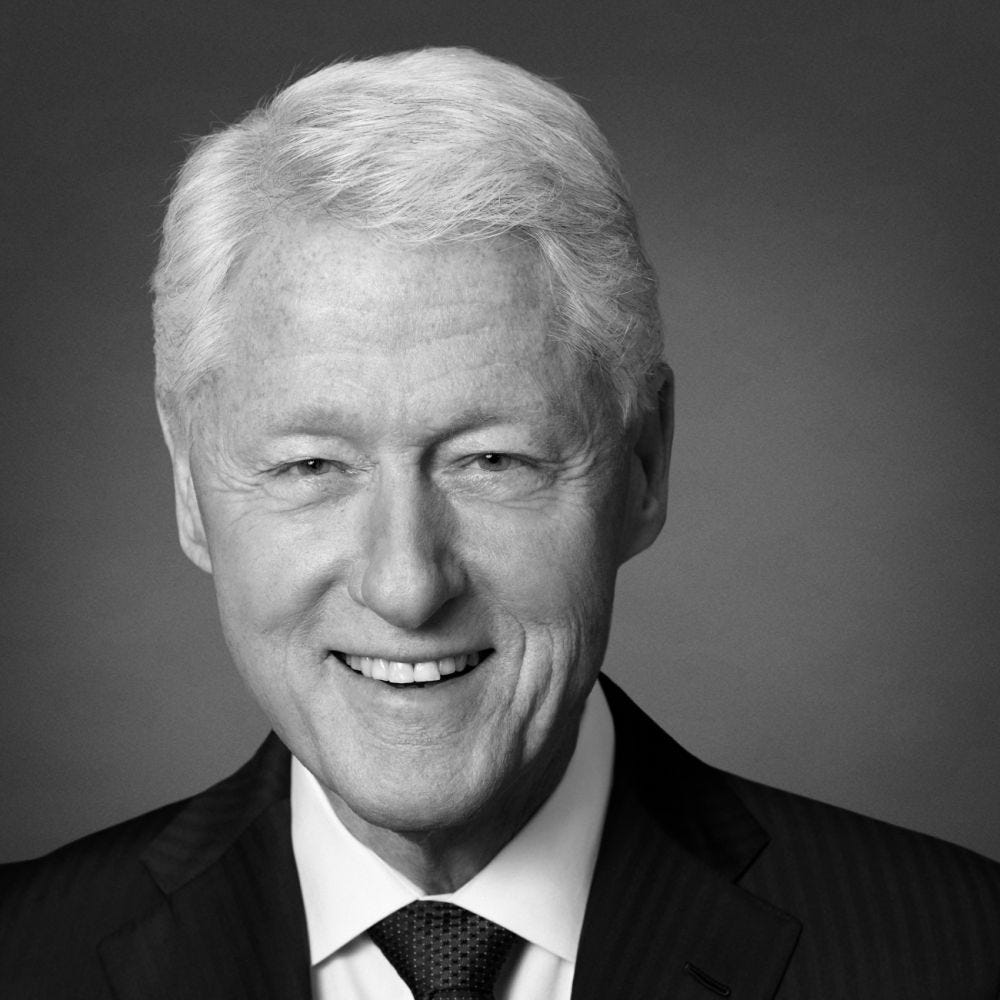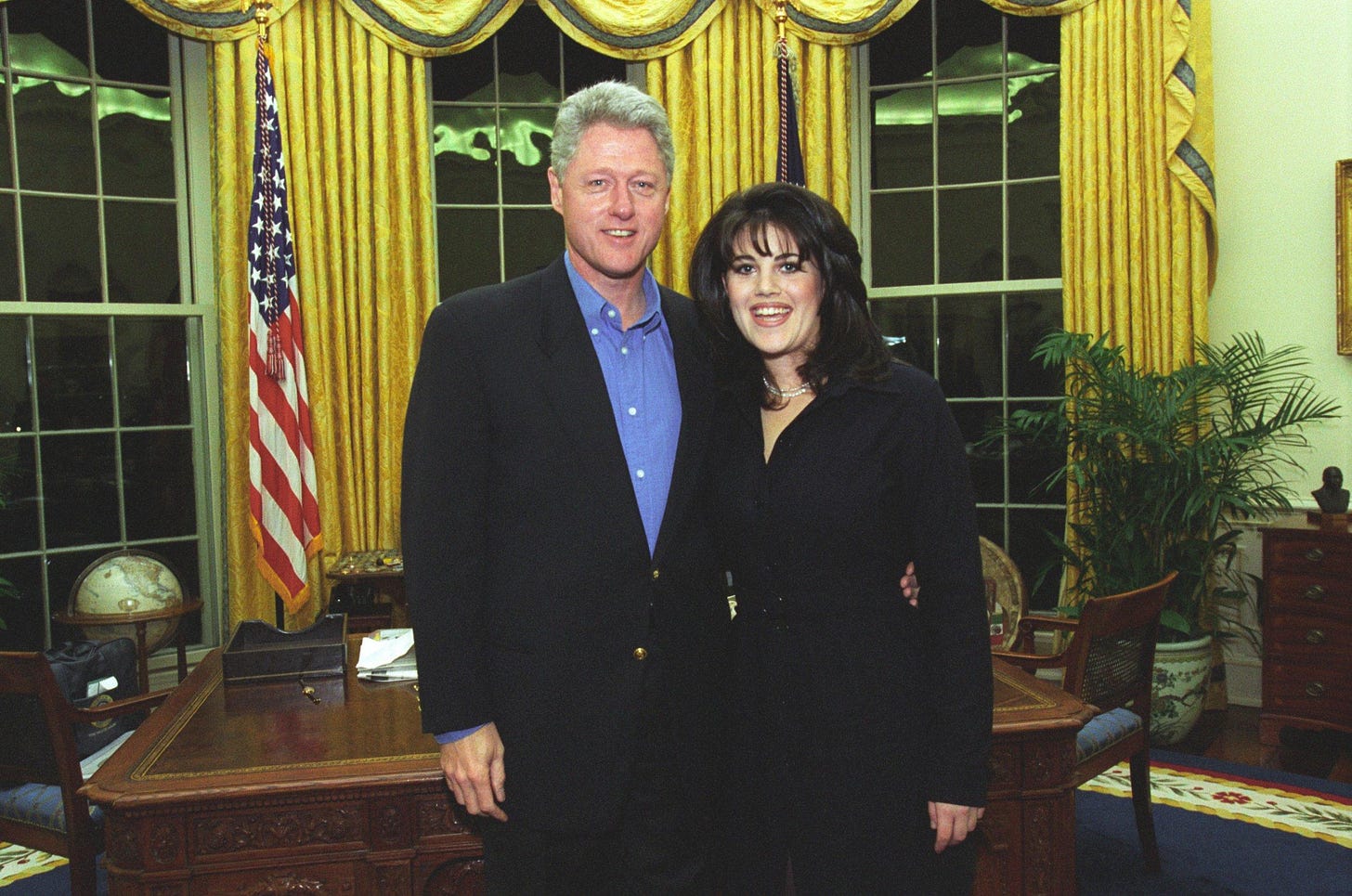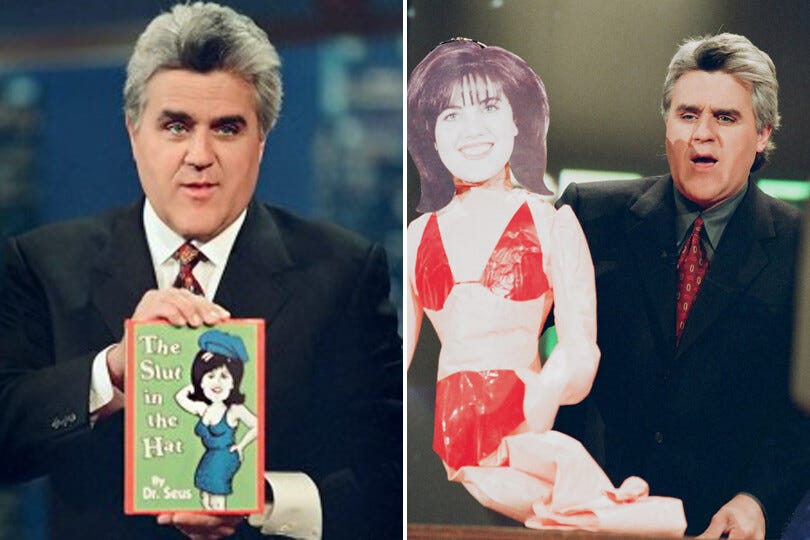On Wednesday Bill Clinton spoke at the New York Times DealBook Summit at the swank Jazz at Lincoln Center. He was third in line under Sam Altman, CEO of OpenAI, and Jeff Bezos, Executive Chairman of Amazon, in a glossy black-and-white headshot with a caption that read: "The first Democratic president in six decades to be elected twice, led the U.S. to the longest economic expansion in American history, including the creation of more than 22 million jobs." No mention of a scandal that rocked the institution of the American Presidency. No mention of a resulting impeachment. No mention of #MeToo.
I try to think about where I was at 22 years-old, the same age as Monica Lewinsky when she entered into an affair with Bill Clinton in 1995. I was still on my parents' health insurance, still on their phone plan, and still getting gift baskets filled with laundry detergent and grocery cards in the mail. I worked. I paid my own way, for the most part, but my frontal lobe (responsible for judgement and impulse-control) wouldn't be done cooking for another two or three years. So if an American President walked up to me and asked me for a few favors, an extra assignment, showed me that I was the favorite in the Oval Office, what would I have done?
"No, thank you, Sir. It wouldn't be right. You're married. I'm young. I just want to work and do something bigger with my life. Let's do the right thing."
Hardly. Maybe if I'd hobbled in a 35-year-old intern, but not at 22.
Maybe it was a simple mistake. Maybe exposing himself to and propositioning Paula Jones was also just a mistake. A lucky mistake that would've wiped him off the political and literary spectrum had it happened a couple decades later. But it didn't. Instead we'll always remember the "Lewinsky Scandal" or the "Lewinsky Affair," that stained blue dress, never the "Clinton Scandal." Bill Clinton went on to serve a second term, leaving office with a 66% approval rating. Lewinsky worked as a spokesperson for Jenny Craig, and after an estimated 44,000 jokes at her expense on The Tonight Show with Jay Leno, left to attend the London School of Economics, graduating with a Master of Science Degree. Her thesis was titled: "In Search of the Impartial Juror: An Exploration of the Third-Person Effect and Pre-Trial Publicity."
"While President Clinton was [Jay Leno's] top target," Lewinsky said in a 2023 Vanity Fair interview, "I was the only one in the top 10 who had not specifically chosen to be a public person."
So why do we as Democrats--and more importantly, as women--still honor a man who brought scandal to the White House, lied to our faces, and continues to live life unapologetically in the spotlight? Meanwhile, it's happening again (albeit on a darker level), and we're furious! Is it a party thing? Is it purely based on politics? Democrats good; Republicans bad? Because I've got to say, Bill Clinton's '90s politics aren't mine. After all, he's the one who signed the Violent Crime Control and Law Enforcement Act of 1994, otherwise known as the "1994 Crime Bill," that led to mass incarceration, authorized the death penalty for existing and new federal crimes, and introduced the "three strikes you're out" rule, mandating life in prison for a third felony. This included a pretty big uptick in police presence. As a result, the people targeted the most by these new rules were populations of color and those living in communities below the poverty line.

"When blacks ask for better policing, legislators tend to hear more instead," wrote three Ivy League professors in a 2016 NY Times op-ed titled Did Blacks Really Endorse the 1994 Crime Bill? "But while whites received rehabilitation and welfare programs, black citizens found themselves overpunished and underprotected."
Meanwhile Bill Clinton signed the Defense of Marriage Act (DOMA), blocking gay marriage in the United States, and introduced the "Don't Ask, Don't Tell" directive, which didn't help in solving the problem of prohibiting gay men and women from serving in the military. While his views have since shifted, these acts walked America backwards in the conversation about human rights.

Is it because of Hillary? Do we honor the guy because he's her husband and we love and respect her so much? I think at this point she's become an institution all her own, and we owe it to her to see her as the power she is despite her husband: a lawyer, a two-term U.S. Senator, Secretary of State, a tireless fighter for women's rights, and a two-time presidential candidate for a thankless country. It's us, Hillary, not you.
So in a world where we are willing to recognize and cancel the impropriety of men in leadership, in film, in music, in literature, where we ask that our presidential candidates be honest--try not to laugh--and have a clean record, why do we still lift up Bill Clinton as a public speaker and representative of the Democratic Party? Why did he speak at the Democratic National Convention? Why did he stump for Kamala Harris in Pennsylvania, Michigan, Maine, and North Carolina? Why are his books still best sellers? Why is he speaking at one of the most expensive and sought-after conferences of the year?
Did we not make it clear? We're just not that into you, Bill.
Ellie is an author, editor, and owner of Red Pencil Transcripts, and works with filmmakers, podcasts, and journalists all over the world. She lives with her family just outside of New York City.







